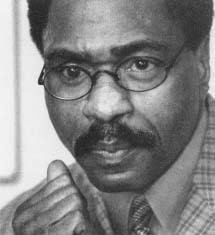Rubin "Hurricane" Carter Trials: 1967, 1988
Moving In On Carter
Immediately the radio call went out to police in Paterson to look for a white car with two black males. About 2:40 A.M., a policeman stopped a white car, but it had three black men; one of them was well known to the policeman, so they were allowed to drive on. But about one half hour later, after one of the men had been left off at his home, the car was stopped by police again. This time, the two remaining men were taken to a hospital where one of the wounded patrons was asked if either of these two were the men who had shot up the bar. He shook his head emphatically no. Back at the police station, the two men were given a lie-detector test, and when it was announced they had passed, they were released. But on October 14, the Paterson police arrested the two black men, John Artis and Rubin "Hurricane" Carter, and charged them with the three murders.
 Rubin "Hurricane" Carter, the man whose case generated two major trials, a series of appeals, several books, a song, and a powerful movie.
Rubin "Hurricane" Carter, the man whose case generated two major trials, a series of appeals, several books, a song, and a powerful movie.
Artis was a 19-year-old who had been a track and football star in high school; soon to be drafted into the army, he was hoping to get a track scholarship to a college; he had no criminal record and had never been in trouble with the police. Carter had a totally different resume. As a young man he had been in frequent trouble with the law, even serving several years in prison; but in the army he had taken up boxing and after leaving prison in 1961 he became a professional. His ferocious manner in the ring earned him the nickname "Hurricane," and by the time of his arrest he was regarded as a potential contender for the middleweight championship of the world.
More significantly for what lay ahead, Carter was an individual who refused to adhere to any of the constraints expected of a black man at that time and in a community like Paterson. He carried on in a flamboyant way—shaved and polished his head, dressed in a flashy style and drove conspicuous cars, frequented nightclubs, played around with women. He also had spoken out bluntly against the injustices visited upon African Americans. All this had earned him the enmity of many white people in Paterson, and the New Jersey police and FBI were known to constantly shadow and harass him. Now Rubin "Hurricane" Carter was charged with three murders.
Additional topics
- Rubin "Hurricane" Carter Trials: 1967, 1988 - First Trial Ends In Conviction
- Other Free Encyclopedias
Law Library - American Law and Legal InformationNotable Trials and Court Cases - 1963 to 1972Rubin "Hurricane" Carter Trials: 1967, 1988 - Moving In On Carter, First Trial Ends In Conviction, Second Conviction Overturned On Appeal